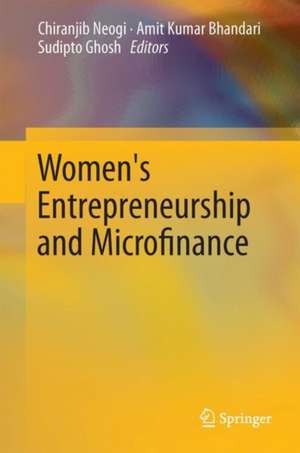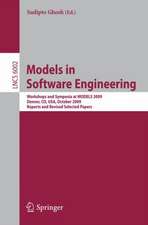Women's Entrepreneurship and Microfinance
Editat de Chiranjib Neogi, Amit Kumar Bhandari, Sudipto Ghoshen Limba Engleză Hardback – 14 mar 2018
| Toate formatele și edițiile | Preț | Express |
|---|---|---|
| Paperback (1) | 553.60 lei 38-44 zile | |
| Springer Nature Singapore – 11 dec 2018 | 553.60 lei 38-44 zile | |
| Hardback (1) | 643.34 lei 43-57 zile | |
| Springer Nature Singapore – 14 mar 2018 | 643.34 lei 43-57 zile |
Preț: 643.34 lei
Preț vechi: 756.86 lei
-15% Nou
Puncte Express: 965
Preț estimativ în valută:
123.10€ • 128.85$ • 102.46£
123.10€ • 128.85$ • 102.46£
Carte tipărită la comandă
Livrare economică 31 martie-14 aprilie
Preluare comenzi: 021 569.72.76
Specificații
ISBN-13: 9789811042676
ISBN-10: 9811042675
Pagini: 176
Ilustrații: XV, 210 p.
Dimensiuni: 155 x 235 mm
Greutate: 0.5 kg
Ediția:1st ed. 2017
Editura: Springer Nature Singapore
Colecția Springer
Locul publicării:Singapore, Singapore
ISBN-10: 9811042675
Pagini: 176
Ilustrații: XV, 210 p.
Dimensiuni: 155 x 235 mm
Greutate: 0.5 kg
Ediția:1st ed. 2017
Editura: Springer Nature Singapore
Colecția Springer
Locul publicării:Singapore, Singapore
Cuprins
Chapter 1: Introduction.- SECTION I: Women Empowerment.- Chapter 2: Women Empowerment in India (by Chaiti Sharma Biswas).- Chapter 3: Measuring Women Empowerment in the Household Sector: A Generalised Index and an Application to Indian Households (by Subhendu Chaktabarti).- Chapter 4: Traditional Institutions and Female Beneficiaries of Mahatma Gandhi National Rural Employment Guarantee Act (MGNREGA) in West Bengal (by Arghya Kusum Mukherjee & Amit Kundu).- Chapter 5: Empowerment of Women through Public Programmes in Rural West Bengal: A Study on National Rural Livelihood Mission in a block of Purulia (by Tithi Bose and Archita Ghosh).- Chapter 6: Non-farm Employment among Rural Women: Trends and determinants (by Aparajita Dhara & Biswajit Chatterjee).- SECTION II: Microfinance in India.- Chapter 7: Efficiency and Mission Drift – Debate Revisited (by Chandralekha Ghosh & Samapti Guha).- Chapter 8: Microfinance andHuman Development: A cross generation study (by Sharmishtha Banerjee & Arijita Dutta).- Chapter 9: Microfinance for Women Owned Small Business in India: Challenges and Opportunities (by Avijit Brahmachary).- SECTION III: Microfinance and Women Entrepreneurship.- Chapter 10: Role of Microfinance in Empowering Rural Women Entrepreneurs in Nadia District of West Bengal (by Bhajan Chandra Barman).- Chapter 11: Going Through the New Avenue of Life: A Study on Factors Working Behind Entrepreneurship Development through Self Help Group (by Kallol Das).- Chapter 12: Effectiveness of Women Entrepreneurs: A case based analysis (by Sanchita Ghatak & Mahima Sharma).- Chapter 13: Access to Finance, Entrepreneurship and Empowerment: A Case Study (by Chirajib Neogi and Sudipto Ghosh).- Chapter 14: Discrimination against Women Entrepreneurs in Access to Credit: An Empirical Analysis (by Rabin Majumdar & Amit Bhandari).
Notă biografică
Chiranjib Neogi is a Retired Associate Scientist at the Economic Research Unit of Indian Statistical Institute, Kolkata. He has been working on the area of productivity and efficiency for many years and has published a number of research papers on this issue in national and international journals. He has published a book “India’s New Economy” from Palgrave, UK, written jointly with Professor Jati K. Sengupta of University of California, Santa Barbara. He has also edited a book on “Productivity and Efficiency”, jointly with Professor Ranjan Ghosh of IIM Kolkata, and the book was published by Macmillan, India. He has also contributed papers in many edited books on the contemporary issues of the Indian economy. He was visiting Research Fellow at the Institute of Developing Economies, Tokyo, Japan in the year 1998–99 and at the Korea Institute for International Economic Policy, Seoul, in 2009.
Dr. Amit K Bhandari is presently an Assistant Professor in Economics atRishi Bankim Chandra Evening College. He has been a Research Fellow at IZA – Institute of Labour Economics, Bonn, Germany. He is a Ph D in Economics from the University of Kalyani. Formerly he was a Lecturer in Economics and Finance at the Indian Institute of Social Welfare and Business Management (IISWBM). His works have published in reputed journals and books. He has a broad interdisciplinary research interest in social, economic and financial issues. His work was funded by Indian Council of Social Science Research and University Grants Commission, India.
Sudipto Ghosh is a Ph.D in Sociology, having expertise in the Micro finance, Entrepreneurship, Planning and Livelihood. Being a Planning expert in the Government sector, he is having ten years experience in the Urban and Rural Sector. He is involved in the preparation of City Planning, various development project reports for local government’s bodies. He is also a SEBI Resource person working for the Financial Literacy programme and involved in advising organization like Amystar Innovations, Kalyani Institute of Applied Research Training & Development (KIARTD) etc in the social development.
Dr. Amit K Bhandari is presently an Assistant Professor in Economics atRishi Bankim Chandra Evening College. He has been a Research Fellow at IZA – Institute of Labour Economics, Bonn, Germany. He is a Ph D in Economics from the University of Kalyani. Formerly he was a Lecturer in Economics and Finance at the Indian Institute of Social Welfare and Business Management (IISWBM). His works have published in reputed journals and books. He has a broad interdisciplinary research interest in social, economic and financial issues. His work was funded by Indian Council of Social Science Research and University Grants Commission, India.
Sudipto Ghosh is a Ph.D in Sociology, having expertise in the Micro finance, Entrepreneurship, Planning and Livelihood. Being a Planning expert in the Government sector, he is having ten years experience in the Urban and Rural Sector. He is involved in the preparation of City Planning, various development project reports for local government’s bodies. He is also a SEBI Resource person working for the Financial Literacy programme and involved in advising organization like Amystar Innovations, Kalyani Institute of Applied Research Training & Development (KIARTD) etc in the social development.
Textul de pe ultima copertă
This book offers a critical perspective on the issues related to women’s empowerment, microfinance, and entrepreneurship in India. Written by distinguishing experts in this field, this book highlights women’s empowerment, which is a process of entrusting power to an individual on the control over resources and decisions. However, these two factors are less effective in a society where religion and cultural dominance is high. The book sheds light on the social security measures undertaken by the government aiming to the right to work helped women who are bounded by social restrictions. Over time there is a shift in rural occupational structure towards non-farm activities, which is largely distress driven self-employment. Access to credit is a great source to provide self-employment that develops self-esteem among women and uplift their position. The book highlights the discrimination against women entrepreneurs in access to credit led to gender biased entrepreneurial society. Association with self-help groups (SHGs) has made women more socially empowered. SHG members help them to change their life in a positive manner through micro-entrepreneurial activities. The book has emphasized on the role of microfinance, which has served the poor to become financially self-reliant. It is observed that for second generation borrowers, the impact of microfinance seems to fizzle out, where MFIs who are gaining efficiency are diverting their objective of servicing poor, signalling a sign of mission drift.
Caracteristici
Reconceptualizes the dynamics of the relationship between women’s empowerment, microfinance, and entrepreneurship in India Presents the investigation of mission drift phenomenon in microfinance in India Understands challenges and opportunities of women entrepreneurship













